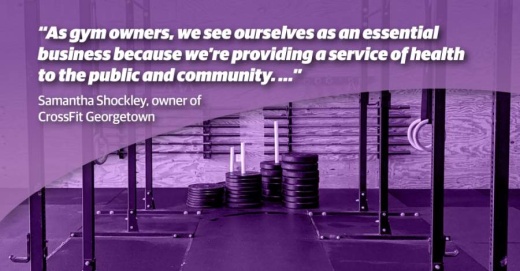But the state did not see it that way.
Instead, gyms were required to remain closed even longer than salons, barbershops and tanning booths, which were allowed to open May 8. Gyms are allowed to open May 18, Gov. Greg Abbott announced May 5.
“As gym owners, we see ourselves as an essential business because we're providing a service of health to the public and community and then to be deemed nonessential, that was the toll that took the hardest because we're here to make people healthy,” Shockley said. “What opened up before [gyms]? Nails salons, hair salons; things that just have to do with aesthetics versus your actual health and being.”
Shockley said being closed for two months caused her business some lost clients, noting gym memberships are a privilege, and when people lose their jobs, it is one of the first ways to cut back financially. She previously had 70 members; now she has 50, she said.
But she has done her best to maintain the clients she does have through virtual workouts, Facebook Live events and even going so far as to rent out gym equipment free of charge to membership holders so clients can continue their regimens at home.
“Virtual coaching was the way to keep our clients engaged and give them a product that they're paying for without actually being there,” Shockley said.
She added that she is more than ready to open May 18 when class sizes will be reduced to 10 maximum and clients will be 6 feet apart with their own designated spots.
Robert Otis, owner of FACT Fitness, also is ready to open May 18 with similar safety precautions in place. His gyms will have no more than six people per class, and clients will remain 6 feet apart with their own set of equipment so there is no cross contamination. This will be a change for his gym, which usually works in rotations of different equipment.
“I think in the short term, people will be receptive of it, the people who are willing to come back and join a gym because they're excited to come back and get their workout done,” Otis said. “But to have the same kind of workout where you stay in place, and you only use a small amount of equipment that you only touch, I don't know how that will affect people in the long run.
“I'm assuming that will get old and boring very quickly,” he added.
Otis said before the coronavirus pandemic, he and his coaches were hosting six to seven classes a day. He said they will try to maintain the number in the first week of reopening and use May to gauge interest before making any decisions for June.
But being closed for so long has created a “significant financial hardship” on his business as he has gone two months without revenue, he said. Otis said he paused charges on all of his clients for the months the gym was closed saying it was just “the right thing to do.”
“We couldn't make similar services available to them,” Otis said of his reasoning to do so. “I tried to put myself in the consumer position. I don’t know if I would have felt comfortable if I couldn't access something that I was still paying for.”
Both Shockley and Otis said they are thankful for the community support they have received during the time they were closed.
“The hardest part is being away from the community because we're all there to push each other,” Shockley said. “We're all there for each other, and we haven't had that, so that that's been tough.”





